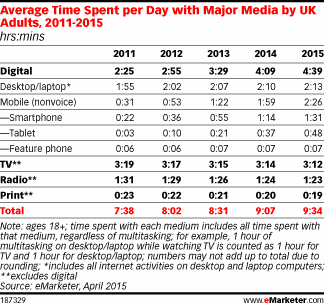In the digital world, we often speak in terms of mobile: responsive websites, mobile reach, apps and marketing therein, along with countless other spheres that are only just becoming available (think wearables like Watch). The reason for this is that, over the past decade, our reliance on the ability to perform tasks on the move that we use to leave until we got to the office has become an unexpected force in a society that can no longer find a café without Google Maps. It should come as no surprise, therefore, that adults in the United Kingdom are now spending longer on their mobile devices than ever before and longer, indeed, than on their desktops.
In a recent blog post we spoke about the Internet of Things , about how our rising reliance on connectedness and efficient technology use is demanding forward thinking amongst businesses, households and governments. This is becoming a poignant point quicker than many of us realise, as we see recent stats showing that UK adults will spend more time today on their mobile phones and tablets than on a desktop computer or laptop.
If you think back to our use of phones 5 years ago, that is an absolutely astounding change. Unexpected? Perhaps not, but astounding nonetheless thanks to the dramatic nature of the movement.

The study by eMarketer shows that we spend 2 hours and 26 minutes, on average, on our mobile devices each day. This involved over an hour and a half on phones and almost 50 minutes on tablets – not including talk time – and compares to 2 hours and 13 minutes on desktop/laptop.
You would be forgiven for thinking you can ditch efforts in you desktop website and focus purely on mobile. In fact, get rid of the IT team and throw money at wearables! The truth, however, is summed up in a crucial point by eMarketer analyst Bill Fisher, who says:
UK adults aren’t moving their media consumption habits to digital platforms at the expense of traditional ones; rather, they are adding it to their overall media day. This also holds true for platforms like social media, with time spent via mobile adding to time spent via laptops and desktops
The study makes it clear that an hour multitasking counts as an hour for both too. So if you’re watching TV and using your phone throughout the episode, TV and Mobile are both deemed used for that full hour.
This is another interesting point, as it highlights the developing inability to stay focused on one medium, which itself opens the doorway to businesses that are seeking to capture customers through quick and catchy campaigns: an audience member being on their phone won’t necessarily ignore your banner ad on that website!
Nevertheless, the importance of Mobile platforms should not be understated, so I will add to the above that Google has taken note of this trend for years, most recently with a tip-of-the-hat through their Mobilegeddon algorithm update.
Secondly, do take care to factor mobiles in to all business decisions. Whether you’re an eCommerce site or a brick-and-mortar only business, mobile is having and will continue to have a major effect on your success.
Get in touch with us if you want to have a chat about how we can help.




